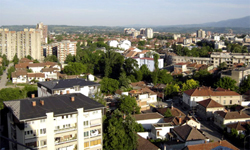
Pobeda is fighting for survival
The oldest weekly magazine in Krusevac has published 3,000 issues but still does not have a new owner

Since the termination of the sales contract with the Bulgarian company "Media Svyat" in March of the last year, not a single potential buyer has contacted the Privatization Agency and expressed interest in purchasing the media company with the history of 67 years. The difficult financial position of employees and the uncertain future of the company are typical of the local media in Krusevac.
For eleven employees and two contributors working for the Newspaper and Information Company Pobeda, each days is filled with struggle for survival. Ever since 2006, when the company was separated from the three-media company RTK Pobeda and offered for sale, Pobeda has been trying to overcome difficulties. Today the company owes the state a sum of around 1.5 million dinars and has trouble trying to find enough money to pay for employees' minimal wages.
- One of our biggest problems since the cancellation of privatization is the fact that this status – which, we were told, was supposed to be temporary – has lasted for a year and a half. In the meantime, not a single interested buyer has appeared, while our unclear status has been an obstacle to conclusion of long-term contracts with advertisers, which are few and far between in any case – says the former representative of the capital in Pobeda, Dragoljub Antic.
Pobeda was privatized in March 2007, when a Bulgarian company, "Media Svyat", paid 1.81 million dinars for a 70-percent ownership of Pobeda and accepted the obligation to invest 300,000 dinars. The contract was terminated in March 2011 because of the failure to continue production, ensure payment of salaries to employees and adhere to the provisions of the collective contract. The termination was preceded by a several month-long employees' strike.
- Ever since the termination of privatization we have faced the utterly bureaucratic attitude of the Privatization Agency, although at the beginning we had received assurances that micro teams would be formed and cooperate with us. Ever since I became the representative of the capital, I have never received any feedback or information after asking for advice or a reply – says Antic, who will soon transfer his duties to Nebojsa Radenkovic, in accordance with the Agency's decision.
However, the state has financed the closure of gaps in payment of employees' wage contributions for the year of 2009, as well as for the first six months of 2010, but the problem of aging equipment (Pobeda owns a small printing press with obsolete equipment) and the lack of working assets has plagued the company after the separation.
- The separation from RTK put us into disadvantageous position. We have inherited a debt in the amount of 400,000 thousand dinars that was not made by the newspaper, as well as around a million dinars of unrecoverable claims from troubled or bankrupted companies. We have also inherited a car with mileage of 300,000 kilometers which was due for general overhaul, despite the fact that RTK had two new cars at the time – says Antic, adding that apart from unpaid taxes, Pobeda was not able to pay health insurance contributions and its employees do not have valid health care booklets.
The situation is similar in the remaining part of the small media scene in Krusevac. In another weekly magazine, GRAD, six employees have remained on their jobs out of eleven. The magazine is fighting for survival and has incurred large debt towards its employees, suppliers and the state. A private TV station, TV Jefimija, which has four employees and seven external contributors, has experienced huge difficulties in the attempt to unfreeze its bank account that had been blocked due to unpaid obligations to SOKOJ in the amount of 500,000 dinars. In the words of the station's financial director, Dragisa Rankovic, operating expenses are too large, including the obligations demanded by the Republic Broadcasting Agency (RRA), while the economic base of the city of Krusevac suffers from the lack of money. Due to these reasons, salaries in the company range from 15,000 to 20,000 dinars.
The regional Radio-Television Krusevac operates as a public service broadcaster and receives slightly more than 30 million dinars from the budget of the City of Krusevac, but the amount is not sufficient to ensure salaries for around 100 employees in the media company.
Media employees in Krusevac are of the opinion that financial survival is becoming more difficult by the day, while the status of journalists is worsening. At the same time, the political influence is getting stronger and it is increasingly difficult to ensure independence of the media or the existence of investigative journalism, which is losing the battle with existential problems of employees in local media outlets.
Nada Budimovic
MC Newsletter,
October 21, 2011
View all comments (0) Leave a comment
Published comments contain opinions that are not the opinions of Media Center. Responsibility for the content of messages and their accuracy lies on the website users who posted them.
 |
| The content of this article does not necessarily reflect the view of the Media Center. The author bear full responsibility for the content of the text. |





